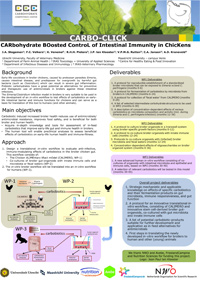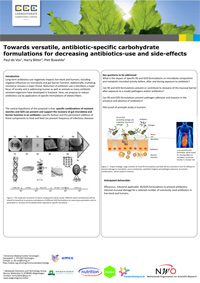CCC NWO CARBOBIOTICS
‘CarboBiotics: pre/probiotics mitigating the antibiotics burden’ is the second program within the NWO-CCC Partnership. It emphasizes the positive effects of carbohydrates and is about research into the effects of antibiotics, prebiotics (poorly digestible carbohydrates) and probiotics (‘good’ bacteria) on stability and recovery of microbiota in the gastrointestinal tract. Understanding the interactions between microbiota and host is necessary to unravel both the positive and negative effects on human and animal health. This will hopefully lead to a better understanding of the mechanisms of action of already available prebiotic carbohydrates, and to the identification and development of new prebiotics and probiotics. The ultimate aim of this program is to generate an efficient pipeline of accurate methods of research. Research in CarboBiotics focuses on humans as well as on farm animals: poultry, pigs and cattle.
Participation parties
Participation parties in the consortium are the comapnies, Friesland Campina, AVEBE an Nutrition Science as well as the knowledge institutes Maastricht University, University of Groningen, University Medical Center Groningen, Utrecht University and Wageningen University.
CarboBiotics started early 2018 with the following five projects:
Catbohydrate induced resilience of the gut microbiota after exposure to antibiotics
Dr. E.G. Zoetendal , WUR
Antibiotics are important for fighting infections. But the down-side of antibiotic use is that it also affects our gut bacteria. As a result we may become more susceptible to intestinal infections or that the metabolism gets affected. The extent to which antibiotics affect the intestinal bacteria, and how fast they recover, for unknown reasons, differs from person to person. This research aims to identify which mechanisms underlie this individual variation and whether we can improve the recovery of gut bacteria after antibiotic use with specific sugars that stimulate certain bacteria.
Beneficial exopolysaccharides to reduce infection and expedite recovery in humans and pigs or different ages
Dr. M.T.C. Walvoort , UoG
The widespread use of antibiotics has led to more bacteria displaying resistance to these powerful drugs. That is why we are looking for alternative ways to combat infections. The researchers in this project are inspired by the sugar layer on the outside of good bacteria. Using chemistry, biochemistry and immunology, they will investigate how the sugar layer contributes to better health and faster recovery. That should allow a reduction of antibiotic use and increase the health of humans and animals.
CARBO-CLICK: CARBOhydrate Boosted Control or Intestinal Immunity in Chickens
Prof. dr. J.A. Stegeman , UU
Intestinal infections are an inevitable threat to broilers and are associated with the use of antimicrobial agents. To diminish this threat we want to investigate whether natural sugar molecules (carbohydrates, inter alia milk and potatoes) may improve intestinal health. In a simulated model of the chicken intestine, including chicken-specific intestinal bacteria, we investigate in which substances the sugar molecules are digested. Subsequently, we test the effects of the sugar molecules and derived digestion products on in vitro intestinal organs, which are grown from intestinal stem cells and are provided with immune cells. This test system for intestinal health promoting effects of sugar molecules is first developed for chicken, and then for humans.
Towards versatile, antibiotic specific carbohydrate formulations for decreasing and using side effects
Prof. dr. P. de Vos , UMCG
Antibiotics are important in the fight against infectious diseases but unfortunately bacteria can become resistant. Antibiotics may also harm the immune system because they do not only kill bad bacteria but also good bacteria. This project uses chemical methods to develop complex carbohydrates that should allow a reduction in antibiotic use. And they must reduce the damage done to good bacteria when antibiotic use is inevitable, such as during serious infections. We will make carbohydrates which strengthen the immune system in the intestinal tract. As a consequence harmful bacteria have less chance to infect humans and farm animals.
Early life effects of human milk oligosaccharides and prebiotics on antibiotic-associated gut microbiota changes and health
Prof. dr. ir. I.C.W. Arts, MU
Treating infants (neonates) with antibiotics may lead to a disturbed development of the microbial ecosystem in the intestine. This project will study whether use of oligosaccharides from milk and indigestible carbohydrates (prebiotics) avoids possible negative short- and long-term side effects of antibiotics. We will combine unique data from the KOALA birth cohort with results from the TIM-2 in vitro colon model, in which faeces of infants are fermented together with antibiotics and prebiotics. With the results of this research we aim to stimulate responsible use of antibiotics and we contribute to the development of prebiotics that can prevent any negative side effects of antibiotics in humans and farm animals.


